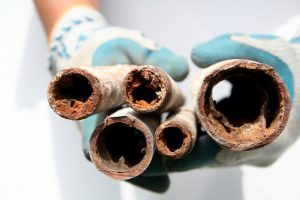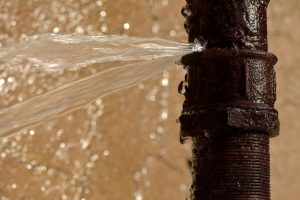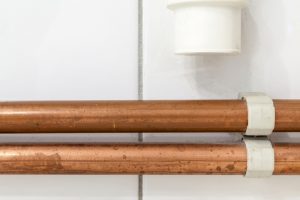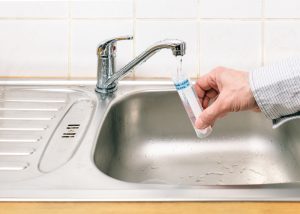 In the first half of the 20th century, and in fact all the way up through the 1970s, the most common type of material used in fresh water pipes for homes and businesses was galvanized steel, lead, cast iron, and even clay. But the cost of these materials, the ease with which they broke and corroded over time, as well as the dangers they posed from allowing toxicity into drinking water, led to them being replaced with new materials by the 1980s: principally copper and various types of plastic such as PEX, PVC, and CPVC. These newer piping materials reduce costs, benefit the environment, last longer, and help keep drinking water safe for households.
In the first half of the 20th century, and in fact all the way up through the 1970s, the most common type of material used in fresh water pipes for homes and businesses was galvanized steel, lead, cast iron, and even clay. But the cost of these materials, the ease with which they broke and corroded over time, as well as the dangers they posed from allowing toxicity into drinking water, led to them being replaced with new materials by the 1980s: principally copper and various types of plastic such as PEX, PVC, and CPVC. These newer piping materials reduce costs, benefit the environment, last longer, and help keep drinking water safe for households.
When you call on our plumbers to replace pipes or to handle more extensive repiping services in Winter Springs, FL, they will use a variety of different materials to see that the best job gets done. And the two materials we favor the most are copper and CPVC (chlorinated polyvinyl chloride).
So why are these two the piping materials of choice? Let’s take a closer look.
Continue Reading
Tags: Corroded Pipes, Pipe Replacement, Repiping, Winter Springs
Posted in Plumbing | Comments Off on Why Our Plumbers Favor Copper and CPVC Piping
 Your plumbing system, be it the most intricate and most important system in your home, was designed to last quite a long time–which is definitely a good thing! However, there are a number of things that can lead to early pipe replacement, and we want to help you avoid them!
Your plumbing system, be it the most intricate and most important system in your home, was designed to last quite a long time–which is definitely a good thing! However, there are a number of things that can lead to early pipe replacement, and we want to help you avoid them!




